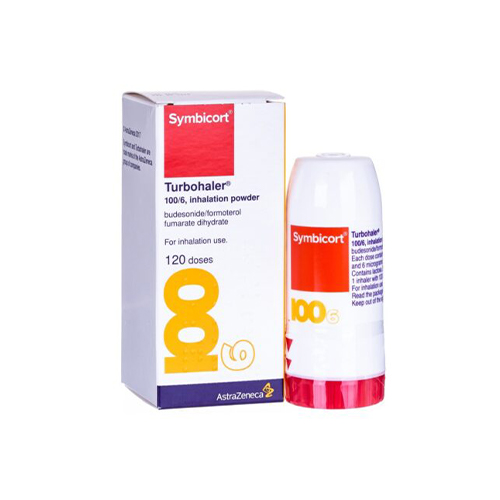- Asthma & COPD preventer
- Reduces inflammation
- Budesonide & Formoterol
Symbicort
Symbicort Inhalers contain two different medicines: budesonide and formoterol. Budesonide belongs to a group of medicines called ‘corticosteroids. It works by reducing and preventing swelling and inflammation in your lungs. Formoterol belongs to a group of medicines called bronchodilators. It works by relaxing the muscles in your airways. This helps you to breathe more easily.
What is Symbicort?
Symbicort Turbohaler is inhaled into the lungs, it is a treatment for asthma and Chronic Obstructive Pulmonary Disease (COPD).
Symbicort Turbohaler contains two active ingredients: Budesonide and Formoterol (as formoterol fumarate dihydrate).
- Budesonide belongs to a group of medicines called corticosteroids. Budesonide acts directly on your airways to reduce inflammation.
- Formoterol belongs to a group of medicines called beta-2-agonists. Formoterol opens up the airways to help you breathe more easily.
Symbicort and asthma
For more information on asthma, its causes and how to treat it please read the comprehensive FAQ at the bottom of the Asthma page
- The budesonide in Symbicort Turbohaler prevents asthma attacks from occurring.
- The formoterol in Symbicort Turbohaler helps you breathe more easily.
Some people can take Symbicort Turbohaler when they need it – they use Symbicort Turbohaler as an anti-inflammatory “reliever” to treat their symptoms when their asthma gets worse and to help prevent asthma attacks, or to help prevent symptoms from happening (eg before exercise or exposure to other triggers such as allergens).
Some people need to take Symbicort Turbohaler every day – they use their Symbicort Turbohaler as a daily maintenance preventer to help maintain control of their asthma symptoms and help prevent asthma attacks.
Ask your doctor if you have any questions about why Symbicort Turbohaler has been prescribed for you. Your doctor may have prescribed it for another reason.
Symbicort and Chronic Obstructive Pulmonary Disease (COPD)
COPD is a long-term lung disease. Symptoms may include difficulty in breathing (breathlessness or wheezing), coughing and increased sputum.
Symbicort Turbohaler can help to control breathing difficulties associated with COPD.
Ask your doctor if you have any questions about why Symbicort Turbohaler has been prescribed for you. Your doctor may have prescribed it for another reason.
How to use Symbicort
How to use your Turbohaler
Follow all directions given to you by your doctor or pharmacist carefully. They may differ from the information contained in this leaflet.
Each pack of Symbicort Turbohaler contains an instruction leaflet that tells you the correct way to use it. Please read this carefully.
–
Techniques on how to use a Turbohaler correctly are shown in this video.
If you are not sure how to use the Turbohaler, ask your doctor or pharmacist to show you how.
How long to use it
If your doctor has told you to take Symbicort Turbohaler daily, it is important that you use it every day even if you feel well.
Symbicort Turbohaler helps control your asthma or COPD but does not cure it.
Keep using it for as long as your doctor tells you to. Do not stop using it unless your doctor tells you to.
Forgot to use it
If you miss a dose of Symbicort Turbohaler, take your dose as soon as you remember.
Do not use a double dose to make up for the dose that you missed. This may increase the chance of you getting an unwanted side effect.
If you are using Symbicort Turbohaler as a reliever medicine, consult your doctor on the correct use of the product.
If you are not sure what to do, ask your doctor or pharmacist.
Overdose
Telephone your doctor, pharmacist, do this even if there are no signs of discomfort or poisoning. You may need urgent medical attention.
If you use too much Symbicort Turbohaler, you may feel sick or vomit, have a fast or irregular heartbeat, a headache, tremble, feel shaky, agitated, anxious, tense, restless, excited or be unable to sleep.
Standard dosage
Asthma
Your doctor may have prescribed Symbicort Turbohaler for you to use as:
- an anti-inflammatory reliever medicine only
- both an anti-inflammatory reliever and a daily maintenance preventer medicine
- as a daily maintenance preventer only, where another medicine is used as a reliever
Your doctor will prescribe the dose that is suitable for you.
If you are using more inhalations of your reliever medicine or you are wheezing or breathless more than usual tell your doctor as your asthma may be getting worse.
Symbicort Turbohaler 100/6 and 200/6
Do not use more than 6 inhalations on a single occasion or more than 12 inhalations of Symbicort Turbohaler (as needed and daily dose) in any day. If your symptoms continue to worsen over 3 days, despite using additional inhalations, tell your doctor.
Symbicort Turbohaler 400/6
NOTE: Symbicort Turbohaler 400/12 is not recommended to be used as anti-inflammatory reliever medicine. Have your separate reliever with you at all times.
COPD (Adults)
The usual dose (also maximum recommended dose) is:
2 inhalations of Symbicort Turbohaler 200/6 twice daily
Or
1 inhalation of Symbicort Turbohaler 400/12 twice daily.
Your doctor should tell you the best way to manage your symptoms and any flare ups. This may include additional medicines (such as reliever medicines) to use when you have sudden attacks of breathlessness.
If you are using more inhalations of your reliever medicine or you are wheezing or breathless more than usual tell your doctor.
If your COPD gets worse, your doctor may give you some additional medicines (such as oral corticosteroids or antibiotics).
Side effects & precautions
Do not use Symbicort Turbohaler if you have an allergy to:
- any medicine containing formoterol or budesonide
- any of the ingredients listed in the patient information leaflet
It may not be safe for you to take Symbicort Turbohaler if you have, or have had, any of these conditions.
- thyroid problems
- diabetes
- heart problems
- liver problems
- tuberculosis (TB)
- low levels of potassium in the blood
Tell your doctor if you have or have had any of the following medical conditions.
Pregnancy and Breastfeeding
Tell your doctor if you are pregnant or intend to become pregnant or breastfeeding. Your doctor will discuss the possible risks and benefits of using Symbicort Turbohaler during pregnancy and while breastfeeding.
Other medications
Some medicines and Symbicort Turbohaler may interfere with each other. These include:
- Medicines used to treat heart problems or high blood pressure such as beta-blockers, diuretics and antiarrhythmics (disopyramide, procainamide and quinidine)
- Medicines used to treat glaucoma such as beta-blockers
- Medicines used to treat depression or another mood/mental disorders such as tricyclic antidepressants, monoamine oxidase inhibitors and phenothiazines
- Medicines used to treat hayfever, coughs, colds and runny nose such as antihistamines
- Medicines used to treat fungal infections (eg ketoconazole)
- Xanthine derivatives (eg theophylline) are a class of medicines used to treat asthma and COPD.
These medicines may be affected by Symbicort Turbohaler or may affect how well it works. You may need different amounts of your medicine, or you may need to use different medicines. Your doctor or pharmacist will advise you.
Side effects
Tell your doctor or pharmacist as soon as possible if you do not feel well while you are using Symbicort Turbohaler.
All medicines can have side effects. Sometimes they are serious, most of the time they are not. You may need medical treatment if you get some of the side effects.
Do not be alarmed by this list of possible side effects. You may not experience any of them.
Tell your doctor or pharmacist if you notice any of the following and they worry you:
- sore, yellowish, raised patches in the mouth (thrush)
- hoarse voice
- irritation of the tongue and mouth
- coughing
These are less likely to happen if you rinse your mouth out after every time you use your usual morning and/or evening dose of Symbicort Turbohaler.
Other common side-effects
- trembling or shakiness
- feeling anxious, nervous, restless or upset
- fast or irregular heart rate or pounding heart
- chest pain
- headache
- feeling light-headed or dizzy
- thirsty
- unpleasant taste in your mouth
- nausea (feeling sick)
- diarrhoea
- difficulty sleeping
- muscle twitching or cramps
- skin rash
- tiredness
- weight gain
- skin bruising
Tell your doctor or pharmacist immediately if you notice any of the following:
- difficulty breathing or worsening of your breathing problems
- swelling of the face, lips, tongue or other parts of the body
- severe rash
- mood changes
These may be serious side effects. You may need urgent medical attention. Serious side effects are rare.
Tell your doctor or pharmacist if you notice anything else that is making you feel unwell. Other side effects not listed above may occur in some patients.
Maintaining your Turbohaler
Cleaning your Turbohaler
The Turbohaler mouthpiece must be wiped with a clean dry cloth/ tissue and must never get wet.
Full instructions on the right way to use and clean Symbicort Turbohaler are inside each pack.
Storage
Keep your Turbohaler in a cool dry place where the temperature stays below 30°C, with the cover firmly in place.
Do not store Symbicort Turbohaler or any other medicine in the bathroom or near a sink.
Do not leave it in the car on hot days or on a window sill. Heat and dampness can destroy some medicines.
Keep it where young children cannot reach it. A locked cupboard at least one and a half metres above the ground is a good place to store medicines.
Documentation
Symbicort Patient Information Leaflet (PIL)



We’re here to help.
Our friendly team is available to help Monday to Friday 9:00am - 5:00pm.
If you need urgent assistance, do not use this service. Call 111, or in an emergency call 999.

